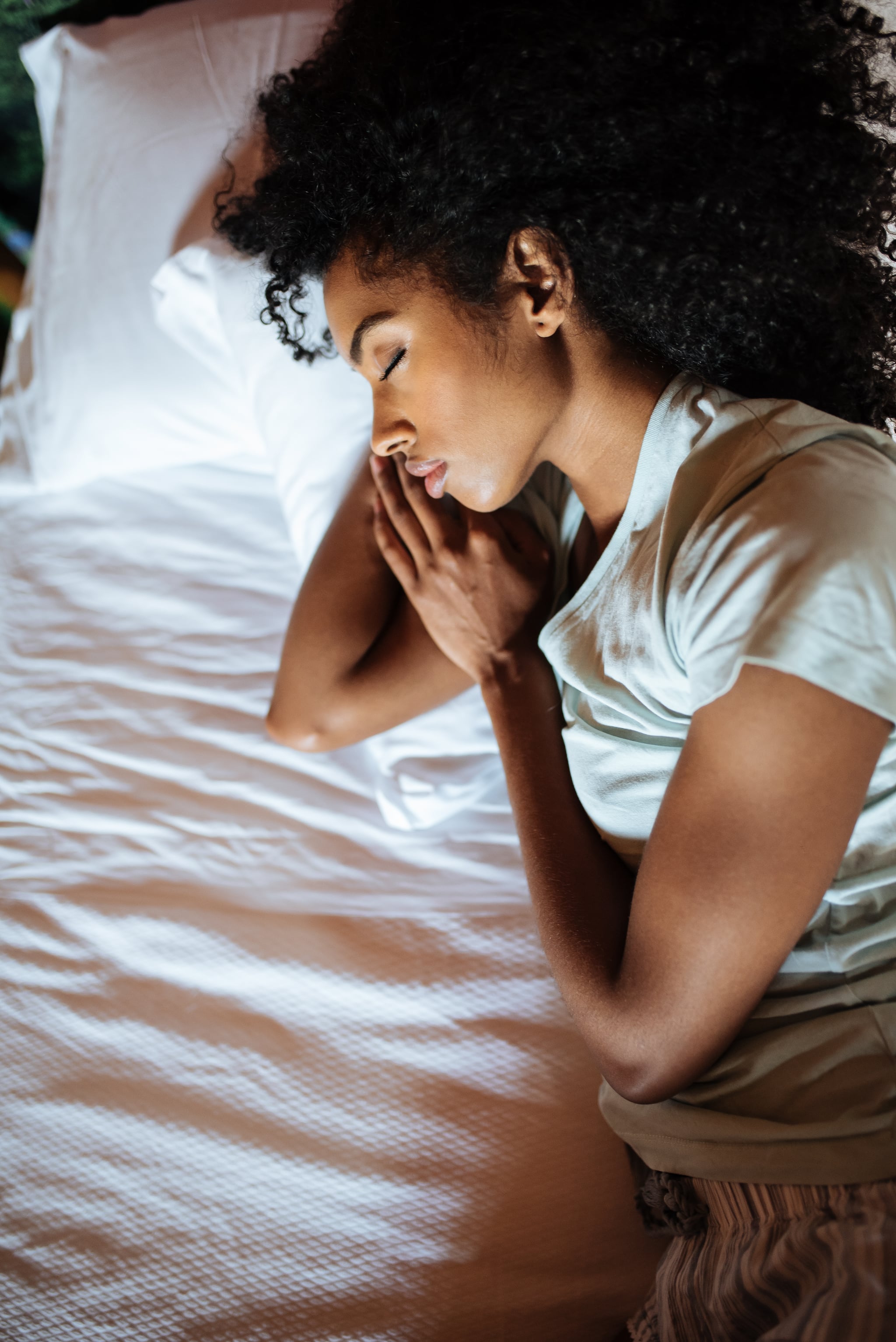
If you've ever had trouble falling asleep at night [1], chances are someone has recommended that you try melatonin [2]. This over-the-counter supplement can help regulate your sleep-wake cycle when taken about an hour before bed [3]. But while melatonin is popular, it could also have some unintended side effects — and experts generally agree that it isn't a long-term solution [4] to your sleep problems.
One of the more surprising side effects of taking melatonin? Nightmares. Here's why they happen — and what you can do to get a more peaceful night's sleep.
Why Does Melatonin Cause Nightmares?
If you've had terrifying dreams while taking melatonin, you're not alone. Melatonin can help you fall asleep faster, but according to Lisa Medalie [5], PsyD, a board-certified behavioural sleep medicine specialist and creator of the children's sleep app DrLullaby, it can also cause you to stay in the deeper stages of sleep [6] longer, which could open the door for more vivid or intense dreams.
"Most people take melatonin because they are experiencing difficulty falling asleep, returning to sleep, or insufficient sleep," Dr. Medalie told POPSUGAR. If you're struggling with any of those things, chances are you're not sleeping long enough to experience periods of rapid eye movement (REM) sleep. "If melatonin is helpful and keeps such individuals asleep for longer, they may then actually experience longer and possibly higher-density REM sleep," Dr. Medalie explained. "With longer bouts of REM from longer sleep periods — and even more likely, with higher-density REM sleep — this allows for the potential of more vivid or intense dream content, as dreams occur during REM sleep."
Kristen Willeumier [8], PhD, neuroscientist and author of BioHack Your Brain: How to Boost Cognitive Health, Performance and Power [9], agreed, citing research that suggests melatonin can normalize REM sleep percentage and REM sleep quality [10]. "While it is currently unclear why melatonin causes nightmares, it is most likely due to its effects on REM sleep, a stage of the sleep cycle when we experience vivid dreams," Dr. Willeumier told POPSUGAR. "REM sleep is a time when we process our unresolved emotions in support of healthy social and emotional functioning. Dreams are a time when we can be exposed to fear-inducing stimuli (i.e., stress, anxiety, and worry) in a safe environment."
So, while melatonin itself isn't necessarily to blame for your nightmares, the deep sleep it allows you to have could be setting the stage for these dreams.
What Should You Do If You're Experiencing Nightmares?
Everybody has nightmares every now and then, but if you're experiencing them regularly and they're affecting the quality of your sleep, you should talk to your doctor.
"In general, if you are taking any OTC or prescription medication that is producing unpleasant side effects, it is appropriate to talk to your doctor about how to safely discontinue," Dr. Medalie said. She added that regular nightmares can be cause for concern, regardless of whether you're taking melatonin or some other supplement or medication. "If nightmares occur outside of taking melatonin, they might be a symptom of either post-traumatic stress disorder, or even nightmare disorder," Dr. Medalie explained. "Those who have a history of trauma may experience flashbacks during sleep (i.e. nightmares), which can cause insomnia, sleep loss, and elevated distress." In that case, it's important that the underlying cause be treated.
"If you are experiencing nightmares, the first thing to do would be to determine if they are related to any other existing general health or mental health issue," Dr. Willeumier said. So, talk to your doctor, who can help get to the root of the problem and suggest a treatment plan, or refer you to a specialist who's better equipped to help. "Non-pharmacological treatment options include cognitive behavioural therapy (CBT), which focuses on addressing the distorted thoughts, emotions, and behaviours with techniques that help correct the distortions in cognition," Dr. Willeumier told POPSUGAR. "There are variations of CBT, including image rehearsal therapy, lucid dreaming, sleep dynamic therapy, systemic desensitization, hypnosis, EMDR therapy, and relaxation and rescripting therapy."
If you suspect melatonin is the sole cause of your nightmares, consider trying some alternative techniques to help you fall asleep at night. Dr. Willeumier recommends establishing a consistent sleep schedule [12], exercising regularly, refraining from eating three hours prior to sleep, avoiding caffeine-containing foods and beverages after 3 p.m., abstaining from alcohol before bed, dimming the lights in the evenings, using filters to block blue light from computer screens and smartphones, and keeping your bedroom temperature cool (between 60 and 67 degrees).
Again, if these healthy habits aren't enough to help you get restful sleep, talk to your doctor. The solution may be as simple as incorporating some soothing stress relief activities into your evening routine, or your doctor may prescribe a different medication or therapy to help. But, no matter what, you shouldn't have to suffer. Good sleep is important, so don't give up!

